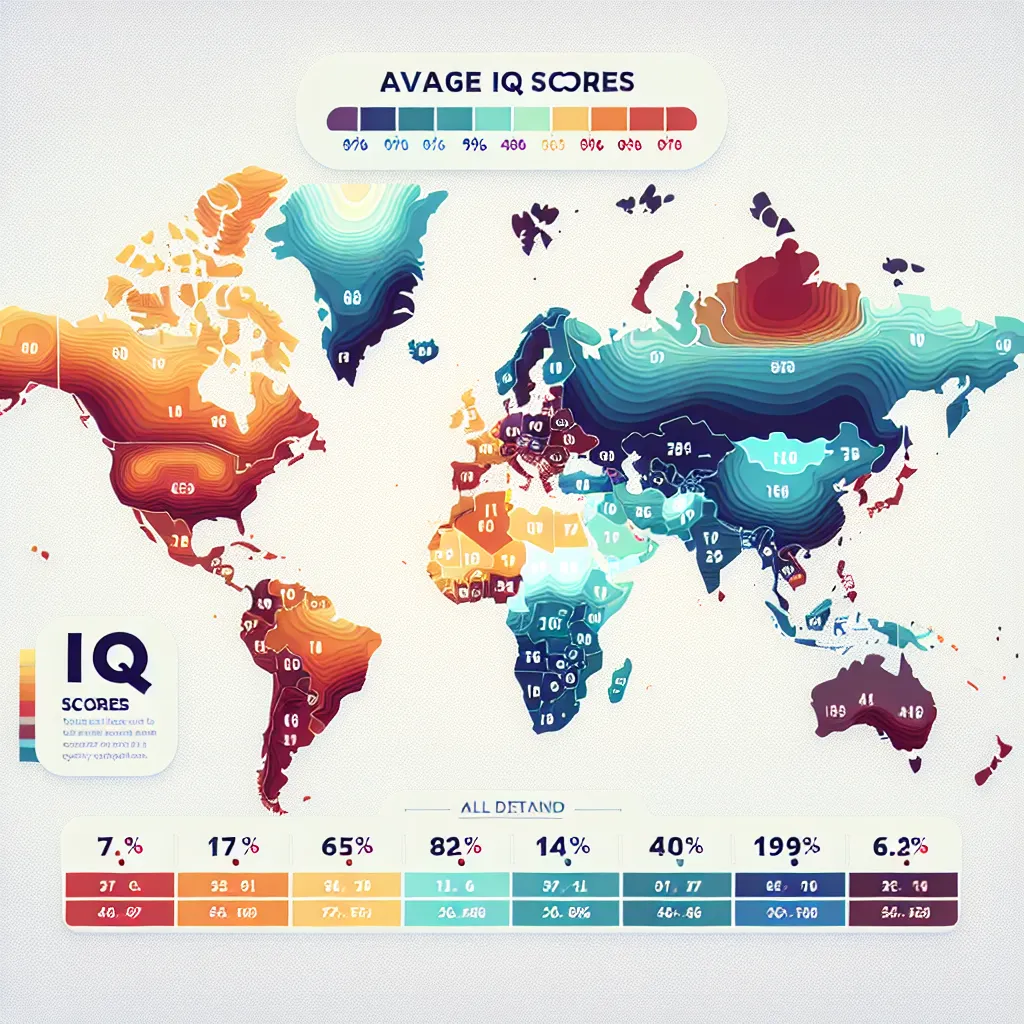Title: Average IQ Score By Country
The fascinating world of intelligence measurement, particularly through IQ scores, continues to captivate researchers and the public alike. Intelligence Quotient (IQ) remains one of the most widely recognized metrics for assessing cognitive abilities, offering valuable insights into how different populations perform on standardized intelligence tests. In our increasingly interconnected world, understanding how IQ scores vary across nations has become more relevant than ever, shedding light on educational effectiveness, societal priorities, and global development patterns.
If you are looking for an excellent way to get your IQ Score, try our highly accurate IQ Test.
Modern intelligence testing has evolved significantly, maintaining 100 as the normalized average score. Recent research has emphasized how these scores are shaped by an intricate combination of genetic predisposition, environmental factors, educational quality, nutritional status, and socioeconomic conditions. This complex interplay makes country-level IQ comparisons both fascinating and nuanced.
East Asian nations continue to lead global IQ rankings, with Singapore, South Korea, Japan, and China maintaining impressive averages between 105 and 108. Recent studies attribute this success not only to their renowned educational systems but also to increasing investments in early childhood development programs and technological integration in learning. The emphasis on STEM education and cognitive development from an early age has further strengthened these nations’ positions.
European countries demonstrate consistently strong performance, with nations like Germany, the Netherlands, and Sweden maintaining averages between 102 and 104. Recent educational reforms in these countries, incorporating artificial intelligence and personalized learning approaches, have helped maintain these high standards. The Nordic model of education, in particular, has gained attention for its balanced approach to cognitive development and overall well-being.
Regions facing ongoing socioeconomic challenges show lower average scores, typically ranging from 70 to 85. However, recent initiatives in many developing nations, including targeted educational programs and improved nutrition schemes, have shown promising results in gradually improving cognitive outcomes. These developments highlight the potential for positive change through focused intervention strategies.
The Flynn effect, which describes the historical trend of rising IQ scores, has shown interesting new patterns in recent years. While some developed nations are experiencing a plateau or slight decline (known as the “Flynn effect reversal”), developing countries continue to show marked improvements, suggesting a potential global convergence in cognitive performance metrics.
Contemporary research has revealed fascinating correlations between environmental factors and cognitive development. Studies now indicate that exposure to air pollution, access to green spaces, and even climate change may influence cognitive development, adding new dimensions to our understanding of national IQ variations.
Cultural intelligence and emotional quotient (EQ) have emerged as crucial complements to traditional IQ measurements. Modern researchers increasingly advocate for a more holistic approach to intelligence assessment, acknowledging that conventional IQ tests may not fully capture the diverse forms of intelligence valued in different societies.
The digital revolution has introduced new considerations in cognitive development. Recent studies suggest that while digital natives show enhanced abilities in certain cognitive areas, such as visual processing and multitasking, other skills traditionally measured by IQ tests may be affected differently. This evolution in cognitive patterns presents both opportunities and challenges for traditional intelligence measurement.
Evidence-based interventions at national levels have demonstrated remarkable success in boosting cognitive development. Countries implementing comprehensive early childhood programs, maternal health initiatives, and environmental protection measures have shown promising improvements in average IQ scores, reinforcing the importance of holistic development approaches.
Modern neuroscience continues to reveal the brain’s remarkable plasticity, suggesting that cognitive enhancement is possible throughout life. This understanding has led to innovative educational approaches and cognitive training programs being implemented across different countries, with measurable impacts on national IQ averages.
Looking ahead, researchers predict that traditional IQ measurements will evolve to better reflect the changing nature of intelligence in our digital age. The integration of artificial intelligence in education, coupled with advances in neuroscience and psychology, suggests that future IQ assessments may look quite different from today’s standards.
In conclusion, while average IQ scores by country remain a valuable metric for understanding global cognitive trends, their interpretation requires careful consideration of numerous factors. As our understanding of intelligence continues to evolve, these measurements serve as important indicators of educational effectiveness and societal development. For those interested in exploring their own cognitive abilities, our highly accurate IQ Test provides a reliable starting point for understanding personal intelligence levels within this broader global context.




Leave a Comment